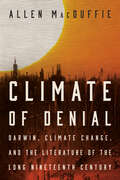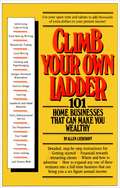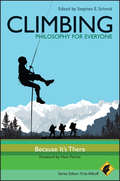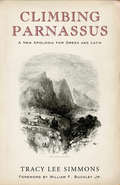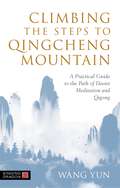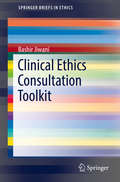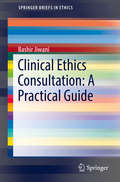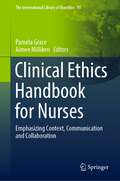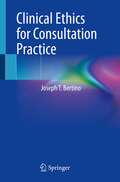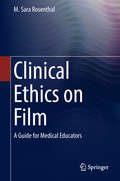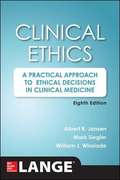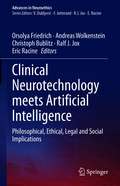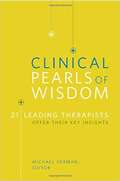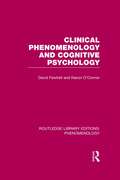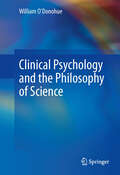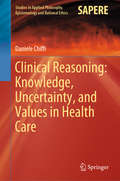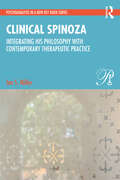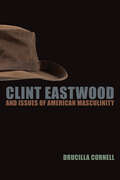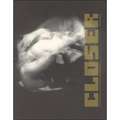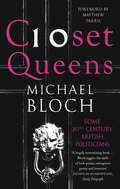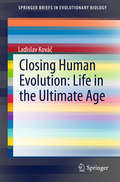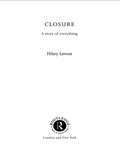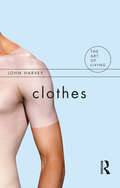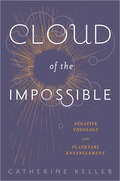- Table View
- List View
Climate of Denial: Darwin, Climate Change, and the Literature of the Long Nineteenth Century
by Allen MacDuffieMany people today experience the climate crisis with a divided state of mind: aware of the extreme effects, but living everyday life as if the crisis is not actually happening. This book argues that this structure of feeling has roots that can be traced back to the nineteenth century, when Western culture encountered the profound shock of Charles Darwin's theory of evolution. Darwin's theory made it increasingly difficult for secular humanists to flatly deny that humans are animals, fully enmeshed in natural systems and processes. But like those of us confronting climate change today, many writers and scientists struggled to integrate its depersonalizing vision into their understanding of the place of humans in the natural order. The result was that the radical environmental implications of The Origin of Species were evaded as soon as they were articulated, abetted by a culture of denial structured by the illusions of capital and empire. In light of the climate emergency, Climate of Denial recontextualizes nineteenth-century texts to offer rich insight into the defensive strategies used—then and now—to avoid confronting the unsettling realities of our situation on this planet.
Climb Your Own Ladder: 101 Home Businesses That Can Make You Wealthy
by Allen LieberoffOffers suggestions on how to start a home business and which home business might be successful for you.
Climbing - Philosophy for Everyone
by Fritz Allhoff Hans Florine Stephen E. SchmidClimbing - Philosophy for Everyone presents a collection of intellectually stimulating new essays that address the philosophical issues relating to risk, ethics, and other aspects of climbing that are of interest to everyone from novice climbers to seasoned mountaineers. Represents the first collection of essays to exclusively address the many philosophical aspects of climbing Includes essays that challenge commonly accepted views of climbing and climbing ethics Written accessibly, this book will appeal to everyone from novice climbers to seasoned mountaineers Includes a foreword written by Hans Florine Shortlisted for the Boardman Tasker Prize for Mountain Literature, 2010
Climbing Parnassus: A New Apologia for Greek and Latin
by Tracy Lee SimmonsClimbing Parnassus presents the reader not so much with a program for educational renewal as with a defense and vindication of the formative power of Greek and Latin. Tracy Lee Simmons's persuasive witness to the unique, now all-but-forgotten advantages of study in, and of, the classical languages constitutes a bracing reminder of the genuine aims of a truly liberal education.
Climbing the Steps to Qingcheng Mountain: A Practical Guide to the Path of Daoist Meditation and Qigong
by Wang YunMount Qingcheng, one of China's mystical mountains, has been the birth place of discovery, realization and preservation of the recipes that stimulate the deep potential of the human body for generations. This is the book of a Daoist master and spiritual guide Wang Yun as a young seeker and tells the tales of his inner journey which now guides the reader on a path of healing, rejuvenation and actualization of the body's innate potential.Climbing the Steps to Qingcheng Mountain brings Wang Yun's knowledge and wisdom to the West for the first time. · It serves as a guide to health and spiritual practices· including meditation and qigong exercises · based on centuries of Daoist knowledge and wisdom. · Through tales ranging from Daoist immortals to sleep-deprived salesmen, · this book offers guidance to support physical and mental wellbeing in this modern, stressful world.For a preview, exercise videos and more about the author:www.modernwisdomtg.com
Clinical Ethics Consultation Toolkit (SpringerBriefs in Ethics)
by Bashir JiwaniThis workbook is a companion to Clinical Ethics Consultation: A Practical Guide to Changing Culture, Building Capacity and Solving Problems Case by Case. The Toolkit lays out the process for clinical ethics consultation in a series of steps within five phases: Pre-Consult, Interviews, Mid-Consult, Consult meeting(s), and Post-Consult. For each step, the Toolkit provides directions for how to complete it, tips for success, and worksheets for capturing data and analysis. The Clinical Ethics Consultation Toolkit is the playbook from which clinical ethics consultants can draw methods and strategies for effectively delivering ethics consultation.
Clinical Ethics Consultation: A Practical Guide (SpringerBriefs in Ethics)
by Bashir JiwaniThis book provides a careful and comprehensive, step-by-step method for providing clinical ethics consultation. This Guide can be applied in almost any healthcare setting and takes the reader from establishing an intake process and developing strategies for interviewing those involved in the situation, to undertaking a consultation meeting and following up on a clinical consult. The book is an invaluable resource to any clinical ethicist, or committee or consult team member who is seeking to provide their service with rigour and quality. Written in simple language, the book explores ideas and concepts that will help the reader to understand, think through, and ultimately offer useful ethical consultation when facing ethically challenging issues.
Clinical Ethics Handbook for Nurses: Emphasizing Context, Communication and Collaboration (The International Library of Bioethics #93)
by Pamela Grace Aimee MillikenThis handbook provides tools for nurse educators, ethics educators, practicing nurses and allied health professionals for developing confidence and skill in ethical decision making in interdisciplinary settings such as acute and chronic care hospitals and clinics. It is useful for all healthcare personnel who face ethical issues in the course of their work and who work with nurses to resolve these issues. While the content is based on a US context, the concerns of nurses internationally are discussed and emphasized. Nurses working in acute and chronic care settings face many obstacles to providing good care and are often the first line of defense related to patient safety and meeting the needs of patients and their families. Some of the obstacles to optimal patient care are institutional, some sociocultural, and others the result of inadequate communication. Evidence points to the idea that while nurses do have the knowledge and skills to address practice problems of various sorts, they may not be confident in their skills of ethical decision making and advocacy actions. This is a resource to develop moral agency on behalf of individuals and to address broader barriers to good care raised at the local, community, or social levels.
Clinical Ethics for Consultation Practice
by Joseph T. BertinoThis book provides a robust analysis of the history of clinical ethics, the philosophical theories that support its practice, and the practical institutional criteria needed to become a practicing clinical ethicist.Featuring cases and a step-by-step approach, this book combines knowledge points associated with moral philosophy and medicine with general skill objectives for ethics consultants. The book aids in developing analytic moral reasoning skills for clinical ethicists, fostering the comprehensive education and professional development of clinical ethics consultants. In addition, it offers key components of how an ethics consultation curriculum manifest in an educational venue for clinical ethicists are illustrated. Adaptable and relevant for educating multiple disciplines in health care, this resource enables ethicists to understand the philosophical foundations and practical application of clinical ethics.
Clinical Ethics on Film: A Guide for Medical Educators
by M. Sara RosenthalThis book discusses feature films that enrich our understanding of doctor-patient dilemmas. The book comprises general clinical ethics themes and principles and is written in accessible language. Each theme is discussed and illuminated in chapters devoted to a particular film. Chapters start with a discussion of the film itself, which shares details behind the making of the film; critical reception; casting and other facts about production. The chapter situates the film in a history of medicine and medical sociology context, analyzes ethical issues raised in the film from a clinical ethics lens, and explains to readers how to use each film as a teaching aid for clinical ethics. Readers will understand how each film in this collection served to bring particular clinical ethics issues to the public’s attention, or reflected medico-legal issues that were part of the public discourse. The book is a perfect instructor's guide for anyone teaching bioethics, healthcare ethics, medical sociology, medical history, healthcare systems narrative medicine, or nursing ethics.
Clinical Ethics: A Practical Approach to Ethical Decisions in Clinical Medicine
by Albert R. Jonsen William J. Winslade Mark SieglerTrust the proven "Four Box" method to formulate ethically appropriate recommendations for patient care. Clinical Ethics teaches healthcare providers how to effectively identify, evaluate, and resolve ethical issues in clinical medicine. Using the author acclaimed "Four Box Method" and numerous illustrative case examples, this book enables practitioners to gain a better understanding of the complexities involved in ethical cases and demonstrates how to reach resolution to ethical problems. Clinical Ethics goes beyond theory to offer a decision-making strategy applicable to real-world practice. Readers will learn an easy-to-apply system based on simple questions about medical indications, patient preferences, quality of life, and contextual features that clearly explain clinical ethics and help them formulate a sound diagnosis and treatment strategy. The case examples have been selected to demonstrate how principles apply to real-world everyday practice. The co-authors, a bioethicist, a physician and a lawyer/ psychoanalyst /philosopher, draw on more than forty years respectively of clinical experience to select exemplary cases of ethical problems and to reflect on how moral principles and concepts can guide clinicians in formulating ethically appropriate recommendations for patient care. A unique chapter organization: Each chapter of the book begins with some general considerations about the topic, and the ethical principle relevant to that topic. The clinical situations that generate ethical problems are then described and illustrated by clinically realistic medical cases. A short distillation of current opinion from the bioethical literature is provided, followed by an analysis of the cases. . The authors conclude with recommendations that the three authors have formulated from their extensive experience as bioethics consultants.
Clinical Neurotechnology meets Artificial Intelligence: Philosophical, Ethical, Legal and Social Implications (Advances in Neuroethics)
by Ralf J. Jox Eric Racine Orsolya Friedrich Andreas Wolkenstein Christoph BublitzNeurotechnologies such as brain-computer interfaces (BCIs), which allow technical devices to be used with the power of thought or concentration alone, are no longer a futuristic dream or, depending on the viewpoint, a nightmare. Moreover, the combination of neurotechnologies and AI raises a host of pressing problems. Now that these technologies are about to leave the laboratory and enter the real world, these problems and implications can and should be scrutinized.This volume brings together scholars from a wide range of academic disciplines such as philosophy, law, the social sciences and neurosciences, and is unique in terms of both its focus and its methods. The latter vary considerably, and range from philosophical analysis and phenomenologically inspired descriptions to legal analysis and socio-empirical research. This diversified approach allows the book to explore the entire spectrum of philosophical, normative, legal and empirical dimensions of intelligent neurotechnologies. Philosophical and legal analyses of normative problems are complemented by a thorough empirical assessment of how BCIs and other forms of neurotechnology are being implemented, and what their measurable implications are. To take a closer look at specific neurotechnologies, a number of applications are addressed. Case studies, previously unidentified issues, and normative insights on these cases complement the rich portrait this volume provides. Clinicians, philosophers, lawyers, social scientists and engineers will greatly benefit from the collection of articles compiled in this book, which will likely become a standard reference work on the philosophy of intelligent neurotechnologies.
Clinical Pearls of Wisdom: 21 Leading Therapists Offer Their Key Insights
by Michael KermanHere, for your reading and clinical pleasure, is a book that contains just these clinical "pearls" of wisdom, from the field's leading practitioners. Represented in this collection is the "take-away" message from some of the most popular conference presenters active in the field today. It covers a rich range of perspectives on the most common presenting problems: depression, trauma, anxiety, grief, couples issues, and child and adolescent difficulties. Each entry follows a similar 3-part format. First is the pearls, a brief listing of three clinical pearls based on feedback the author has received over the years from colleagues, students, book reviewers, and workshop participants. Next is the case example, a presentation of a case that best exemplifies the "pearls" in action. This section also includes an analysis by the author--why they did what they did and what they thought about it then, and now. Finally, each author provides a series of concluding remarks about the preceding material and offers readers a sense of their thinking behind their clinical work, and how this approach might be integrated into other people's client work. These innovative practices and tools will enlarge your therapeutic repertoire, and complement your existing knowledge base. Contributors:Pat Ogden, Bill O'Hanlon, and Michael Stone on depressionDusty Miller, Diana Fosha, and Babette Rothschild on traumaReid Wilson and Margaret Wehrenberg on anxietyKenneth Doka, Robert Neimeyer, and Sameet Kumar on griefSue Johnson, Carolyn Daitch, and Evan Imber-Black on working with couplesDan Hughes, Lenore Terr, and Aureen Wagner on working with childrenJanet Edgette, Martha Straus, and David Wexler on working with adolescentsDavid Wallin on the therapist's attachment patterns
Clinical Phenomenology and Cognitive Psychology (Routledge Library Editions: Phenomenology)
by Kieron O'Connor David FewtrellCognitive therapies are often biased in their assessment of clinical problems by their emphasis on the role of verbally-mediated thought in shaping our emotions, and in stressing the influence of thought upon feeling. Alternatively, a more phenomenological appraisal of psychological dysfunction suggests that emotion and thinking are complementary processes which influence each other. Cognitive psychology developed out of information-processing models, whereas phenomenological psychology is rooted in a philosophical perspective which avoids the assumptions of positivist methodology. But, despite their different origins, the two disciplines overlap and complement each other. This book, originally published in 1995, illustrates how feeling states are a crucial component of mental health problems and, if adequately differentiated, can result in a greater understanding of mental health.
Clinical Psychology and the Philosophy of Science
by William O'DonohueThe motivation for this volume is simple. For a variety of reasons, clinical psychologists have long shown considerable interest in the philosophy of science. When logical positivism gained currency in the 1930s, psychologists were among the most avid readers of what these philosophers had to say about science. Part of the critique of Skinner's radical behaviorism and thus behavior therapy was that it relied on, and thus was logically dependent on, the truth of logical positivism--a claim decisively refuted both historically and logically by L.D. Smith (1986) in his important Behaviorism and Logical Positivism: A Reassessment of the Alliance.
Clinical Reasoning: Knowledge, Uncertainty, and Values in Health Care (Studies in Applied Philosophy, Epistemology and Rational Ethics #58)
by Daniele ChiffiThis book offers a philosophically-based, yet clinically-oriented perspective on current medical reasoning aiming at 1) identifying important forms of uncertainty permeating current clinical reasoning and practice 2) promoting the application of an abductive methodology in the health context in order to deal with those clinical uncertainties 3) bridging the gap between biomedical knowledge, clinical practice, and research and values in both clinical and philosophical literature. With a clear philosophical emphasis, the book investigates themes lying at the border between several disciplines, such as medicine, nursing, logic, epistemology, and philosophy of science; but also ethics, epidemiology, and statistics. At the same time, it critically discusses and compares several professional approaches to clinical practice such as the one of medical doctors, nurses and other clinical practitioners, showing the need for developing a unified framework of reasoning, which merges methods and resources from many different clinical but also non-clinical disciplines. In particular, this book shows how to leverage nursing knowledge and practice, which has been considerably neglected so far, to further shape the interdisciplinary nature of clinical reasoning. Furthermore, a thorough philosophical investigation on the values involved in health care is provided, based on both the clinical and philosophical literature. The book concludes by proposing an integrative approach to health and disease going beyond the so-called “classical biomedical model of care”.
Clinical Spinoza: Integrating His Philosophy with Contemporary Therapeutic Practice (Psychoanalysis in a New Key Book Series)
by Ian MillerDiscovering Spinoza's early modern psychology some 35 years into his own clinical practice, Ian Miller now gives shape to this connection through a close reading of Spinoza's key philosophical ideas. With a rigorous and expansive analysis of Spinoza's Ethics in particular, Miller explores how Spinozan thought simultaneously empowered the original conceptual direction of psychoanalytic thinking, and anticipated the field's contemporary theoretical dimensions. Miller offers a detailed overview of the philosopher's psychoanalytic reception from the early work of German-langauge psychoanalytic thinkers, such as Freud and Lou Andreas-Salomé, forward into its Anglophone reception, influencing both mid-century humanistic American psychoanalysis as well as anticipating thinkers such as Bion and Winnicott. Covering key concepts in psychoanalytic theory and clinical practice, this book demonstrates how knowledge of Spinoza's philosophical work can help to both illulminate and improve modern psychoanalytic therapies.
Clint Eastwood and Issues of American Masculinity
by Drucilla CornellIn this risk-taking book, a major feminist philosopher engages the work of the actor and director who has progressed from being the stereotypical “man’s man” to pushing the boundaries of the very genres—the Western, the police thriller, the war or boxing movie—most associated with American masculinity. Cornell’s highly appreciative encounter with the films directed by Clint Eastwood revolve around the questions “What is it to be a good man?” and “What is it to be, not just an ethical person, but specifically an ethical man?” Focusing on Eastwood as a director rather than as an actor or cultural icon, she studies Eastwood in relation to major philosophical and ethical themes that have been articulated in her own life’s work.In her fresh and revealing readings of the films, Cornell takes up pressing issues of masculinity as it is caught up in the very definition of ideas of revenge, violence, moral repair, and justice. Eastwood grapples with this involvement of masculinity in and through many of the great symbols of American life, including cowboys, boxing, police dramas, and ultimately war—perhaps the single greatest symbol of what it means (or is supposed to mean) to be a man. Cornell discusses films from across Eastwood’s career, from his directorial debut with Play Misty for Me to Million Dollar Baby.Cornell’s book is not a traditional book of film criticism or a cinematographic biography. Rather, it is a work of social commentary and ethical philosophy. In a world in which we seem to be losing our grip on shared symbols, along with community itself, Eastwood’s films work with the fragmented symbols that remain to us in order to engage masculinity with the most profound moral and ethical issues facing us today.
Closer: Performance, Technologies, Phenomenology
by Susan KozelIn Closer, Susan Kozel draws on live performance practice, digital technologies, and the philosophical approach of phenomenology. Trained in dance and philosophy, Kozel places the human body at the center of explorations of interactive interfaces, responsive systems, and affective computing, asking what can be discovered as we become closer to our computers--as they become extensions of our ways of thinking, moving, and touching. Performance, Kozel argues, can act as a catalyst for understanding wider social and cultural uses of digital technology. Taking this one step further, performative acts of sharing the body through our digital devices foster a collaborative construction of new physical states, levels of conscious awareness, and even ethics. We re-encounter ourselves and others through our interactive computer systems. What we need now are conceptual and methodological frameworks to reflect this. Kozel offers a timely reworking of the phenomenology of French philosopher Maurice Merleau-Ponty. This method, based on a respect for lived experience, begins by listening to the senses and noting insights that arrive in the midst of dance, or quite simply in the midst of life. The combination of performance and phenomenology offered by Closer yields entwinements between experience and reflection that shed light on, problematize, or restructure scholarly approaches to human bodies using digital technologies. After outlining her approach and methodology and clarifying the key concepts of performance, technologies, and virtuality, Kozel applies phenomenological method to the experience of designing and performing in a range of computational systems: telematics, motion capture, responsive architectures, and wearable computing. The transformative potential of the alchemy between bodies and technologies is the foundation of Closer. With careful design, future generations of responsive systems and mobile devices can expand our social, physical, and emotional exchanges.
Closet Queens: Some 20th Century British Politicians
by Michael BlochCloset Queens is a fascinating study of gay men in twentieth century British politics, from Lord Rosebery and Lord Beauchamp in Edwardian times to Michael Portillo and Peter Mandelson in our own era. As all homosexual activity was illegal until 1967, and exposure meant ruin and disgrace, such men were obliged either to repress their sexual feelings or else lead double lives, indulging their tastes secretly while respectably married with children.The need to cover up their sexuality, while causing problems and disappointments, often sharpened their skills as politicians - they were masters of secrecy and subterfuge, and knew how to take calculated risks. An entertaining and insightful account of some extraordinary personalities, Closet Queens opens doors into a hidden world.
Closing Human Evolution: Life in the Ultimate Age (SpringerBriefs in Evolutionary Biology)
by Ladislav KováčThis volume analyses the evolution of humankind by combining approaches from science and the arts. It offers a novel perspective on the evolution of life on Earth, based on a recent reformulation of the second law of thermodynamics in terms of the "maximum entropy production principle. " In essence, the Earth is but one of many "white holes" in the universe, where life functions as a specific arrangement for the rapid dissipation of energy gradients by generating self-organized structures. Evolution of life in the universe is a creative process of increasing complexity as a Bayesian ratchet of knowledge accumulation, advancing in an evolutionary maze characterized by myriad blind alleys. On Earth, the human species has progressed more than any other by creating artefacts that have become both agents and products of in our cumulative cultural evolution. Culture has dramatically enhanced the rate of dissipation of energy gradients. Extrapolating from the acceleration of cultural evolution suggests that humanity will reach the Civilization Singularity in the middle of the 21st century, a point in time at which the rate of changes, and hence their unpredictability and uncontrollability, will converge to infinity. Humankind has now entered the ultimate age, in which the exuberance and splendour of human feats may be metaphorically likened to fireworks. The author highlights a new role of scientists as intellectuals who can create "music for the fireworks" by analysing the consequences of the astounding dynamics in order to make the closing phase of human evolution a sublime one marked by minimal political and social tensions.
Closure: A Story of Everything
by Hilary LawsonFor over 2000 years our culture has believed in the possibility of a single true account of the world. Now this age is coming to a close. As a result there is a deep unease. We are lost both as individuals, and as a culture. In the new relativistic, post-modern era, we have no history, no right or moral action, and no body of knowledge. In their place is a plethora of alternative, and sometimes incompatible theories from 'fuzzy logic' to 'consilience' proposing a theory of everything. Closure is a response to this crisis. It is a radically new story about the nature of ourselves and of the world.Closure exposes the central questions of contemporary philosophy: language and meaning, of the individual and identity, of truth and reality, but it is also philosophical in the broader everyday sense that it enables us to make sense of where and who we are. A central principle, the process of closure, is shown to be at the heart of experience and language. As a theory of knowledge it has dramatic consequences for our understanding of the sciences, involving a reinterpretation of what science does and how it is able to do it. It similarly proposes a profound shift in the role of art and religion. But, above all, it reshapes our understanding of ourselves and the organisation of society, our goals and our capacity to achieve them.A superb new account of how order is created out of disorder, Closure is an exhilarating work of conceptual geography.
Clothes (The Art of Living)
by John HarveyClothes protect our vulnerable skin and they keep us warm or cool. They help us show that we are young or old, rich or poor, at work or play, and whether we may be good to know. But though they are basic, much as food and shelter are - and also may be beautiful - they have long had a bad press in serious, moral and philosophical writing. The main reason for this is that they are external to us, a cover we may hide behind, and one on which some people spend too much money, perfecting a pompous plumage of vanity: also they, and the fashions for them, may not last long. Nonetheless, when we choose our own clothes, we know the choice is a sensitive matter and far from being merely superficial. John Harvey considers the overlapping values that clothes have for us. Clothes both cover and advertise the bodies within them. They help make us the men and women we are, and help us to attract each other. They enroll us in groups, from our own circle to our generation worldwide; and they show just how, as individuals, we want to be noticed. Clothes, like their wearers, may compete in claiming power. They may also, on and off the catwalk, compete to claim the spotlight. In sum they show how we think we matter - and they can matter themselves in ways that may be intimate and even crucial to us. At all times clothes have demanded attention, even when they have been castigated for their vanity, and contemporary opinion is still divided. Are clothes the most frivolous of consumer disposables - or are they, however extravagant, art? Though we wear and see them every day, the value that they have for us is multiple and fugitive and hard to catch exactly. "Clothes" attempts to sort the many-coloured wardrobe which marks off mankind from other creatures.
Cloud of the Impossible
by Catherine KellerCatherine Keller is professor of constructive theology at Drew University. Her work interweaves process relationalism and poststructuralist philosophy with an evolving feminist cosmopolitics. At once constructive and deconstructive in approach, it engages questions of ecological, social, and spiritual practice amidst an irreducible indeterminacy. Among her many books are Apocalypse Now & Then; God and Power; and The Face of the Deep: A Theology of Becoming.
Cloud of the Impossible: Negative Theology and Planetary Entanglement (Insurrections: Critical Studies in Religion, Politics, and Culture)
by Catherine KellerThe experience of the impossible churns up in our epoch whenever a collective dream turns to trauma: politically, sexually, economically, and with a certain ultimacy, ecologically. Out of an ancient theological lineage, the figure of the cloud comes to convey possibility in the face of the impossible. An old mystical nonknowing of God now hosts a current knowledge of uncertainty, of indeterminate and interdependent outcomes, possibly catastrophic. Yet the connectivity and collectivity of social movements, of the fragile, unlikely webs of an alternative notion of existence, keep materializing--a haunting hope, densely entangled, suggesting a more convivial, relational world.Catherine Keller brings process, feminist, and ecopolitical theologies into transdisciplinary conversation with continental philosophy, the quantum entanglements of a "participatory universe," and the writings of Nicholas of Cusa, Walt Whitman, A. N. Whitehead, Gilles Deleuze, and Judith Butler, to develop a "theopoetics of nonseparable difference." Global movements, personal embroilments, religious diversity, the inextricable relations of humans and nonhumans--these phenomena, in their unsettling togetherness, are exceeding our capacity to know and manage. By staging a series of encounters between the nonseparable and the nonknowable, Keller shows what can be born from our cloudiest entanglement.
